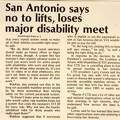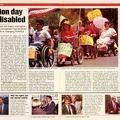ADAPT (463)
San Antonio, read their lips: “No lifts, no
$1.6 million convention.
[This story is continued on 478 but it is included here in its entirety for ease of reading.]
The President's Committee on Employment of People with Disabilities will not hold its annual convention in San Antonio in 1991 because that city has no mainline accessible transit and
no plans to introduce any.
Instead, the meeting will be held in Dallas, which has 100 lift-equipped buses and plans to introduce more. It is estimated that the meeting, which will attract 4,000 to 5,000 people, would have brought at least $1.6 million to San Antonio.
Committee chairman Harold Russell said he was informed of San Antonio's position on accessible public transit in January by Wayne Cook, general manager of VIA, San Antonio's transit system.
Russell said the committee's decision was in keeping with President Bush's promise to bring the 37 million Americans with disabilities into the economic work force. "Disabled Americans must become full partners in America's opportunity society,” the President told Congress.
In order to make the President's vision a reality, Russell said mainline accessible public transit has to be an option for people with disabilities who want to join the work force.
“We have found that, next to attitudes, lack of accessible transportation is the most important significant barrier to
employment of people with disabilities," Russell said. "There are 8.2 million people with disabilities of working age in this country who are unemployed but who can work and want to work. That's a terrible waste of talent, and it's not fair to the people who are prevented from working."
Russell said his committee's mission to help people with disabilities find employment would be compromised if they held their annual meeting in San Antonio.
"The issue is not transportation for people who attend our meeting," he said. “It’s everyday access to mainline transit for people with any kind of disability who "want to work and can work.” The committee's credibility was at stake, he added.
Russell expressed his regret about the move. “San Antonio is a beautiful city, with wonderful people. The mayor and members of the city administration are working very hard to make the city accessible to everyone. Maybe we can come to San Antonio at a later date, when VIA's policy has changed.”
Kent Waldrep, chairman of the Texas Governor's Committee for Disabled Persons, supported the decision to move the convention to Dallas.
“This is one way that those of us who work in the disability field can support the goal of employment. We're not saying that every transit system needs to make all of their vehicles accessible right away,” he said.
“We do think that transit operators should make an honest effort to begin that process, though. A system like San Antonio's that requires advance notice to travel just won't work for active people with disabilities who work-and shop and do all the things other people do. It’s not fair to riders or to their employers, who can't ask them ‘to travel around the city on short notice in the course of their work.”
Waldrep also pointed out that in the long run accessible mainline ‘service would be far more economical than relying solely on the current paratransit system. “It doesn't make sense to make people who would rather ride mainline buses use a system that costs the taxpayers $13.50 for every ride. Why not save the heavily subsidized rides for those people who really need them?"
Waldrep suggested that if everybody who is eligible to use the paratransit system in San Antonio did so, VIA wouldn't be able to pay the bill.
“In the long run, putting lifts on buses will save money,” he said, "as well as being the right thing to do.”
In response to the decision by the President's committee, the Coalition of Texans with Disabilities (CTD) announced" that CTD has is cancelling plans to hold its annual meeting in San Antonio.
CTD president Larry Correu said that his group has met with VIA over the years to discuss the system ’s reluctance to provide accessible mainline service. He pointed out that VIA has been under a court order since 1985 to supply such service.
“Maybe if CTD and a lot of other state and national organizations refuse to hold their meetings in San Antonio, they'll understand how serious the issue is,” he said.
Correu said he has learned that several other organizations were also planning on boycotting San Antonio.
- Created on
- Friday 12 July 2013
- Posted on
- Friday 11 September 2015
- Tags
- accessible transit, barrier, boycott, CTD - Coalition of Texans with Disabilities, Harold Russell, Kent Waldrep, Larry Correu, mainline accessible transit, PCEPD - President's Committee on Employment of People with Disabilities, President George HW Bush, San Antonio, Texas Governor's Committee for Disabled Persons, VIA, Wayne Cook
- Visits
- 2150
- Rating score
- no rate
- Rate this photo


0 comments